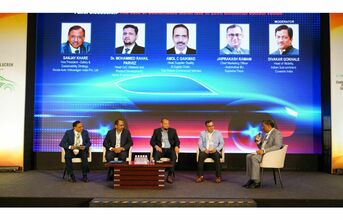
The first panel at the conference revolved around a discussion on ‘The Role of Sustainable Materials in Environmental Conservation.' Speakers on the panel were Mohammed Rahail Parvaiz, Head CoC (Material and Product Development), Varroc Engineering Private Limited; Sanjay Khare, Vice President, Safety & Sustainability Strategy, Skoda Auto Volkswagen India Private Limited; Amol Gaikwad, Head Supplier Quality & Supply Chain, Tata Motors Commercial Vehicles, and Jaiprakash Ramani, Chief Marketing Officer, Automotive BU, Supreme Group. The panel was moderated by Divakar Gokhale, Head of Mobility, Indian Sub-continent, Covestro India.
The discussion commenced with Gokhale directing a question to the representatives from original equipment manufacturers (OEMs), Amol Gaikwad and Sanjay Khare. He inquired about the key government policies in place for the automotive industry that would drive the adoption of sustainable materials.
Khare stated that his discussions with Niti Ayog regarding the circular economy in the automotive sector have given him the impression that the government has a clear objective. The goal is to establish specific percentages for recycled and virgin materials. The automotive industry underwent a significant transformation from BS4 to BS6, requiring substantial investments and rapid process changes. These advancements have swiftly taken place in India as the government is ambitiously striving to grow the economy from 3.5 billion dollars to 7 trillion dollars in 7-8 years.
He added that cuurently, manufacturing contributes over 15 per cent to the existing 3.5 trillion-dollar economy, with a substantial portion coming from the automotive industry, amounting to nearly 550 billion dollars. With the aim of making manufacturing 25 per cent of the 7 trillion-dollar economy, the automotive industry's value would surpass 1750 billion dollars, reflecting a 3.5-fold growth in the next 5-6 years. This growth mindset guides the government's actions, prompting officials like Piyush Goyal to organise numerous conclaves.
Khare expects exportation to play a crucial role in this economic expansion. The shift from rural to urban areas will be evident, with a strong reliance on the manufacturing and logistics sectors. Skoda-Volkswagen currently exports about 35-40 per cent of its production to economies below the equator, including Mexico. Plans are underway to expand exports to Vietnam and various African regions.
He cautioned that if there is continued extraction, there is a risk that these resources will be depleted. Therefore, the concept of a circular economy revolves around achieving economic development without compromising finite resources. The goal is to create a self-sustaining system without the need for continuous extraction.
However, there's positive news. In addition to regulatory measures and government initiatives, significant technological developments are underway. Khare mentioned that just last week Skoda Volkswagen's Material and Finish department organised an event showcasing their efforts. They are working on monomaterials—those without multi-layered plastics and designed for clear recyclability. Their focus includes haptics and AI-based simplified designs to ensure that all parts are recyclable. Moreover, both Skoda and Volkswagen have committed to using 100 per cent recycled PET for automotive seats in Europe. Audi has pioneered the use of bio-based materials and life-cycle adjustments, leading to a 5-6 percent improvement in fuel efficiency. Luxury brands like Lamborghini and Porsche have extensively used composites for lightweighting purposes.
areas driving the entire initiative accroding to him. First, we have sustainability, encompassing requirements for lightweighting, fuel efficiency, and recyclability. The second area involves regulations, while the third centres on bottom-up initiatives—what actions innovators and responsible citizens can take.
Gaikwad emphasised that the government has adopted an assertive approach towards the rapid development observed in the automotive sector. He pointed to the forthcoming AIS 129 guidelines, which will require a specified percentage of sustainability and recyclability at the vehicle level. While this practice is already common in developed countries, it is yet to be implemented in India. Further, regulatory factors play a significant role in shaping the decisions of OEMs, influencing choices related to raw materials, technology, product design, and sourcing strategies. OEMs are not only expected to comply with regulations but also to ensure that the technology is prepared well in advance of these regulatory changes.
Continue Reading on Page 2


























